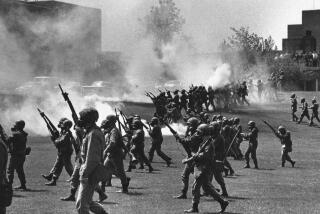‘The Outpost,’ ‘Into the Fire’ look back at the war in Afghanistan
The Outpost
An Untold Story of American Valor
Jake Tapper
Little, Brown: 652 pp., $29.99
Into the Fire
A Firsthand Account of the Most Extraordinary Battle in the Afghan War
Dakota Meyer and Bing West
Random House, 239 pp., $27
When news broke that the American Consulate in Benghazi, Libya, had been attacked and four Americans killed, two questions dominated the immediate postmortem: Why wasn’t there better protection in advance? Why wasn’t the response faster when the attack began?
The same questions hover over two superbly reported and compelling books about the ground war in Afghanistan: “The Outpost: An Untold Story of American Valor” by ABC News senior White House correspondent Jake Tapper; and “Into the Fire: A Firsthand Account of the Most Extraordinary Battle in the Afghan War” by Medal of Honor recipient Dakota Meyer and veteran battlefield author Bing West.
Both books ask disturbing questions about how and why the U.S. has waged a decade-long war in which U.S. goals are murky, U.S. allies are often corrupt and unreliable and the enemy enjoys a sanctuary in Pakistan.
Each centers on a specific battle in 2009 in the treacherous mountains of eastern Afghanistan. Eight Americans were killed in the fight at Combat Outpost Keating, as detailed by Tapper; five Americans were killed at a village called Ganjigal, where Meyer’s resolve, courage and defiance of orders brought him the nation’s highest award for combat bravery.
The scenarios were similar: An American redoubt was lightly defended despite warnings of impending Taliban attacks. And when the inevitable attack occurred, Afghan allies were mostly useless and the U.S. higher command was shamefully slow to respond with air power or reinforcements.
Tapper was not present during the fight but through interviews, documents and follow-up reporting trips to Afghanistan, he has woven an intricate account about battlefield bravery hamstrung by military bureaucracy and sluggishness. His aim is to portray the complexity of the American situation; complexity takes time and, at 652 pages, “The Outpost” may require more commitment than some readers can muster.
West takes a different approach: to show the essence of the U.S. war in Afghanistan by giving voice to a naive but patriotic farm boy from Kentucky who enlisted in hopes of seeing combat, and then, seeing it, responded with great courage but left appalled by the loss of life and the behavior of some of his superiors at the higher echelon. Essence can be conveyed with greater economy than complexity, hence “Into the Fire” is half the length of “The Outpost.”
Tapper writes that an Army intelligence analyst had come to realize that “the Army seemed clueless when it came to institutional knowledge. There was no real information at Combat Outpost Keating about the surrounding area, no historical data about the people or any record of the two previous companies’ experiences during their deployment.”
At Ganjigal, when Taliban fighters ambushed a patrol of Afghan soldiers and Marine advisors, a desperate call was made for air support. Instead of a quick response, a sergeant was asked to provide the battle roster and the Social Security numbers of the Americans in danger, according to “Into the Fire.”
Meyer, frustrated and angry, disobeyed orders to stay put and instead dashed repeatedly into the firefight to rescue trapped comrades. In some cases, he was too late. Even as he received the Medal of Honor from President Barack Obama, Meyer felt like a failure: “As a Marine, you either bring your team home alive or you die trying. My country was recognizing me for being a failure and for the worst day of my life.”
Back in the U.S., Meyer was diagnosed with post-traumatic stress disorder and ordered to a clinic for eight weeks. His account of his return to the U.S. is vivid and disturbing.
“When I got home in December, I felt like I had landed on the moon …,” he writes. “Some guys really go nuts when they come back, and I wasn’t in danger of that, but I could feel the kinds of crazy things that maybe got the better of them … You are over there long enough, and under such constant battle stress, that it resets all your settings way into the red and they are very hard to set back.”
Tapper follows soldiers who, like Meyer, were beset with troubles even months after arriving safely at home.
“The outpost never left him,” he writes of a young soldier, months after leaving Afghanistan, “[he] would stay up late at night watching insurgents’ videos on YouTube. He told a friend from 3-61 Cav, Brian Casey, that he heard gunfire and saw Taliban on a daily basis.... At the end of July, Ed Faulkner Jr. ran naked into the street, yelling that the end of the world was coming.”
Days after Faulkner died alone in a filthy apartment of acute methadone intoxication, an office worker from the Department of Veterans Affairs called Faulkner’s father: “Would you let your son know that he’s late for his appointment?”
Tapper’s voice is understated, not polemical — just a good reporter letting the facts speak for themselves. He quotes one of Faulkner’s friends: “I kinda think he was the ninth victim of Keating … And I honestly don’t think he’ll be the last.”
Meyer, in telling his own story, is blunt in his assessment of what happened at Ganjigal: “We weren’t fighting a war: we were holding a few acres of dirt while the war swirled around outside our barbed wire.”
In both Combat Outpost Keating and Ganjigal, a military investigation was launched to see why troops on the ground were not better supported before or during the enemy attack. The result boiled down to “mistakes were made” — an explanation that the authors of “Into the Fire” and “The Outpost” damn as a feeble excuse.
In an epilogue, West, a former assistant secretary of Defense and chronicler nonpareil of the wars in Iraq and Afghanistan in books like “No True Glory,” “The Strongest Tribe” and “The Wrong War,” writes that, “In its ferocity, valor, treachery and bungling, Ganjigal was extraordinary … [Meyer’s] story stands as a metaphor for the war. It illustrates three themes: a frustrating war, a misplaced strategy, and the grit of the American warrior.”
More to Read
Sign up for our Book Club newsletter
Get the latest news, events and more from the Los Angeles Times Book Club, and help us get L.A. reading and talking.
You may occasionally receive promotional content from the Los Angeles Times.








